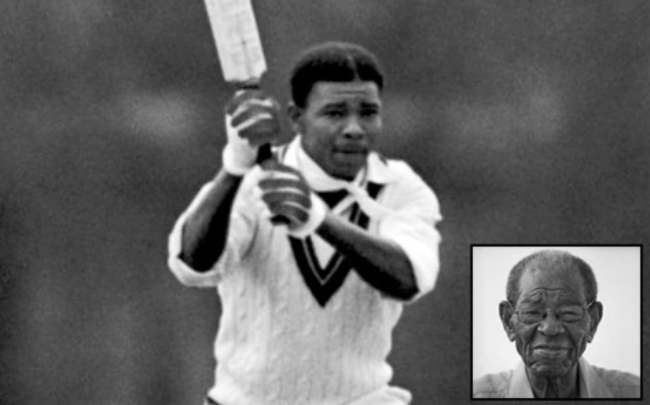Sir Everton Weekes: The West Indies Pioneer Who Redefined Cricket’s Colour in Whites

In the fading days of British colonialism, Sir Everton Weekes, Sir Frank Worell and Sir Clive Walcott -- the three Ws of West Indies cricket -- established batting records that have stood the test of time and broke the game’s long-standing racial barrier.
The third of the legendary West Indies’ Ws, Sir Everton Weekes passed away yesterday at the age of 95.
The numbers are simple, and great. Weekes played 48 Tests between 1948 and 1958 and amassed 4,455 runs at an average of 58.61. At one stage, between March and December 1948, Weekes registered five successive Test centuries and insisted if it wasn’t for what he called ‘an umpiring error’ -- he was adjudged run-out on 90 -- it would have been six. He passed 1000 Test runs in 12 innings -- one fewer than Sir Don Bradman -- the fastest to the milestone ever. Only nine men who have batted a minimum of 20 times in Test cricket have a higher average than his.
As tributes poured in from across the globe, the picture of a man defined not just by his cricketing achievements but also ones which transcended sport slowly began to emerge. Weekes was born in extreme poverty in Barbados. He quit school at the age of 14 and was barred from playing cricket at his local club Pickwick as they only permitted white players. He was allowed to enter the hallowed Kensington Oval -- Pickwick’s home ground -- early in the morning before the gates opened to help roll the pitch and cut the grass.
Also Read | Sanjita Chanu: What Happened With Me Was Wrong, Should Not Happen to Anyone Else
In the fading days of British colonialism, Weekes, Worell and Walcott -- three men who shared not just the opening alphabet of their second names, but also batting records that have stood the test of time -- broke the long-standing racial barrier of a sport always held as a badge of excellence by the islands of the Caribbean. Sir Clyde Walcott was the first black captain of British Guyana in 1956, Sir Frank Worrell the first captain of the West Indies and Weekes of Barbados in 1960. Incidentally, they all grew up within a mile of each other and even had their debuts within days of each other.
Weekes earned his West Indies debut aged 23 in 1945 and holds the remarkable record of having hit just one solitary six in his 81 Tests -- against Australia in 1955. The story of that six is the story of the man.
In an interview with the legendary sports broadcaster Tony Cozier, Weekes explained the logic behind why he never hoisted the ball in the air. He credited his childhood for cleaning up his technique. "If you hit the ball in the air and broke someone's window, you weren't getting that ball back, so we had to keep it on the ground."
The story of that six is simple enough too. With the match petering out to a draw at the Queen’s Park Oval in 1955, Weekes allowed himself the liberty of hoisting Bill Johnston over long-on.
"If you only hit one six in your Test career you should remember it, shouldn't you?" Weekes said in that interview with Cozier.
Also Read | Post Covid-19 Cricket World Needs Better Management, Progressive Thinking and Adherence to Logic
Prodded by Cozier to explain another six etched against his name in Calcutta in 1948, Weekes (90 years old at the time of the interview) remembered what happened eloquently and clearly.
"Yes, I remember it. They were overthrows. We'd run two when the ball came in from the deep field and it was so wide of anyone, it went on to the boundary," he said. So still a solitary genuine six.
On that same tour, Weekes produced successive innings of 128 in Delhi, 194 in Bombay and 162 and 101 in Calcutta. He would have had his sixth consecutive century but he was run out for 90 in Madras.
Weekes was 32 when he retired from Tests; his 197 at Kensington Oval in the first match of West Indies’ series against Pakistan in 1958 his only hundred on the ground he had known since he was a boy. He continued leading Barbados for another six years and, in 1965, aged 40, was coaxed into leading a Barbados youth team in a two-day match against Australia. His class was still evident in his 105. He retired at tea.
Retired West Indies fast bowler Ian Bishop in Weekes’ remembrance had perhaps the simplest words to offer. “I had the great privilege of spending time in the company of Sir Everton on several occasions over the past two decades,” Bishop said. “Never once did I leave his presence without feeling a sense of warmth, cheerfulness & having learnt something rich & endearing each time. A truly great human being,” he added.
His batting partners Worell and Walcott are both buried at The Three Ws Oval on the outskirts of Bridgetown in Barbados. While his family’s wishes are unconfirmed, it is well known that a plot amid the bougainvillea has been left vacant for Weekes should he wish to join them.
Get the latest reports & analysis with people's perspective on Protests, movements & deep analytical videos, discussions of the current affairs in your Telegram app. Subscribe to NewsClick's Telegram channel & get Real-Time updates on stories, as they get published on our website.
























